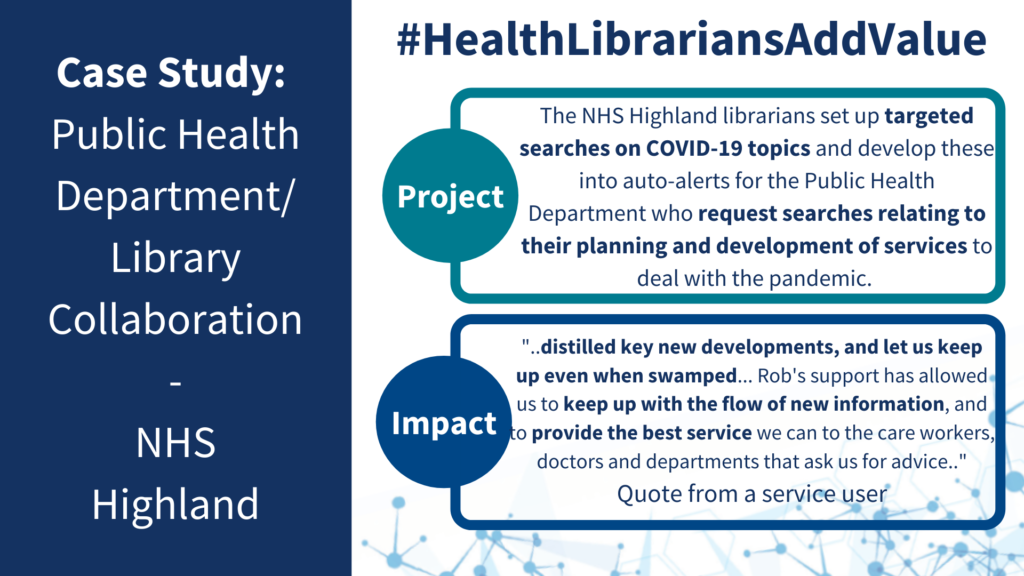Public Health Department/Library Collaboration
This case study is part of Health Librarians Add Value, a campaign run jointly by NHS Education for Scotland (NES) and CILIPS. It has been provided by Rob Polson, Specialist Librarian at the University of the Highlands and Islands. Read other case studies here.
Outline of the project
This project involves a collaboration between an academic library service and an NHS Public Health Department and it relates to the current COVID pandemic.
The NHS has a service level agreement with the University to provide an information service. The area concerned is NHS Highland which covers a remote and rural geographical area comparable to the size of Belgium. All work has been done remotely with communication being via Microsoft Teams and e-mail and with the teams in regular communication. This allows both services to react rapidly to any changes or requirements the Public Health Team may have to contend with.
The Public Health Department requests searches relating to their planning and development of services to deal with the pandemic. The Library sets up targeted searches on these topics and develops these into auto-alerts for the Department. These are reset or redeveloped as the pandemic progresses. Initial examples of searches included monitoring the epidemiology, incidence, and prevalence of the virus. Now the first wave has passed searches are focusing on more long term problems eg rehabilitating people who have been ventilated due to the infection and the health aspects of the economic effects of COVID such as unemployment.
Additionally, the library provides a scanning service that pulls out daily developments and trends in the pandemic. These documents/reports/articles are then retrieved and passed on to the Department for pandemic service development and planning.
Impact
The work done by the library service has been highly valued. Dr Cameron Stark, Consultant in Public Health Medicine at NHS Highland said:
In the first months of the COVID-19 pandemic, our Public Health department had an unrelenting stream of telephone and e-mail queries. Keeping up with new developments, while also answering questions was nigh on impossible. Rob’s work distilled key new developments, and let us keep up even when swamped. The volume of literature on COVID-19, and the speed of publication, is unprecedented. Finding new work, identifying comments and reviews, and finding key updates, is essential, but very challenging. Rob’s support has allowed us to keep up with the flow of new information, and to provide the best service we can to the care workers, doctors and departments that ask us for advice.
The following quote shows how essential library services and librarians are:
We had close links with the library before. This experience has further strengthened our belief that health librarians are an essential front-line resource. The support from the library has been fantastic. Although working from home, they have provided a great service, and have saved us many person hours that we have then been able to re-direct to support front-line decision-making. The relationship with our health librarian has increased the value and quality of the responses we are able to provide by keeping us as up to date as is possible in this ever-changing situation.
